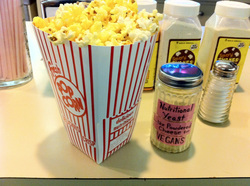
Nutritional yeast is actually not a natural source of B-12. There are a lot of people who are confused about this fact. Some nutritional yeast is fortified, but with an inferior form of the vitamin (cyanocobalamin). A better B-12 supplement is a methylcobalamin variety such as: Jarrow Formulas Methylcobalamin (Methyl B12), 5000mcg, 60 Lozenges (available fairly inexpensively at Amazon.com).
These supplements can even be whole foods based: some studies report that dried green and purple "lavers" (a.k.a. "nori") & chlorella (edible algea) are potent sources of biologically functional B-12 (1).
An important consideration with B-12: it needs to be chewed and well mixed with saliva to be absorbed when it passes through the digestive system (salivary r-proteins adhere to and protect cobalamin compounds from HCL induced degradation). B-12 is naturally produced by bacteria (this is where animals get it). We do get some B-12 from our saliva because we naturally have small amounts of bacteria present in the mouth. This is, however, a very small amount of B-12 potential. The fact that diary and meat products are high in B-12 reveals a significant inherent bacterial contamination. A better source of bacteria for human consumption is that found growing on raw fruits and vegetables - especially broccoli, cabbage, kale, cauliflower, etc., because these vegetables have crevices for the healthy bacteria to congregate (2,3). Also, you would want to avoid over-washing your fresh fruits and vegetables (you can easily wash away most of these healthy bacteria). The bonus with getting your B-12 from plant based sources is that these bacteria are non-pathogenic to humans (unlike bacteria that feed on dead animal tissue) and could also be termed “probiotics."
Dr. Diane Burnett, a physician specializing in lifestyle medicine, related that when her patients would test low on B-12 she would put them on a raw diet for a week or so. She said that it was often amazing how much their levels improved! I take a B-12 supplement every now and then but I also try to have some raw food component in each meal. Even with these raw foods, the B-12 contained therein will only be absorbed if it is thoroughly chewed (and mixed with the saliva in the mouth).
1) J Nutr Sci Vitaminol (Tokyo). 2002 Oct;48(5):325-31.
2) Biotechnol Lett. 2010 Apr;32(4):503-6.
3) Food Microbiol. 2012 Aug;31(1):116-25.
These supplements can even be whole foods based: some studies report that dried green and purple "lavers" (a.k.a. "nori") & chlorella (edible algea) are potent sources of biologically functional B-12 (1).
An important consideration with B-12: it needs to be chewed and well mixed with saliva to be absorbed when it passes through the digestive system (salivary r-proteins adhere to and protect cobalamin compounds from HCL induced degradation). B-12 is naturally produced by bacteria (this is where animals get it). We do get some B-12 from our saliva because we naturally have small amounts of bacteria present in the mouth. This is, however, a very small amount of B-12 potential. The fact that diary and meat products are high in B-12 reveals a significant inherent bacterial contamination. A better source of bacteria for human consumption is that found growing on raw fruits and vegetables - especially broccoli, cabbage, kale, cauliflower, etc., because these vegetables have crevices for the healthy bacteria to congregate (2,3). Also, you would want to avoid over-washing your fresh fruits and vegetables (you can easily wash away most of these healthy bacteria). The bonus with getting your B-12 from plant based sources is that these bacteria are non-pathogenic to humans (unlike bacteria that feed on dead animal tissue) and could also be termed “probiotics."
Dr. Diane Burnett, a physician specializing in lifestyle medicine, related that when her patients would test low on B-12 she would put them on a raw diet for a week or so. She said that it was often amazing how much their levels improved! I take a B-12 supplement every now and then but I also try to have some raw food component in each meal. Even with these raw foods, the B-12 contained therein will only be absorbed if it is thoroughly chewed (and mixed with the saliva in the mouth).
1) J Nutr Sci Vitaminol (Tokyo). 2002 Oct;48(5):325-31.
2) Biotechnol Lett. 2010 Apr;32(4):503-6.
3) Food Microbiol. 2012 Aug;31(1):116-25.

 RSS Feed
RSS Feed